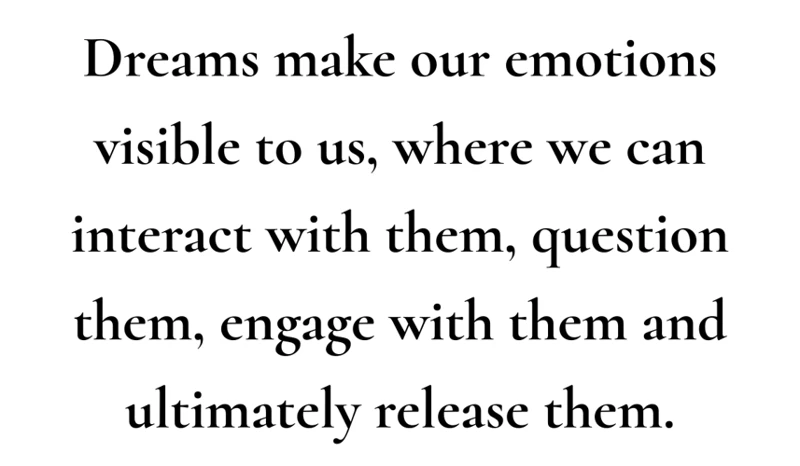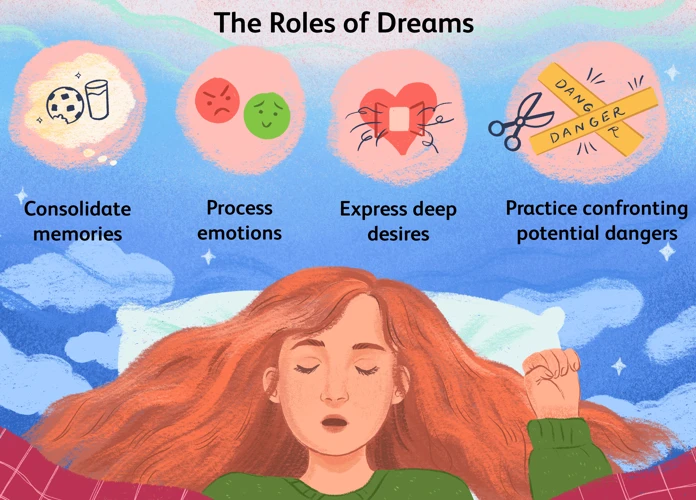Unresolved Emotions: Unlocking the Connection Between Recurring Dreams and Emotional Experiences
Have you ever been plagued by recurring dreams that leave you feeling unsettled and curious about their meaning? These vivid and repetitive dreams can often hold a deep connection to our emotions and unresolved experiences. In this article, we will explore the fascinating realm of recurring dreams and their link to the unaddressed emotions and experiences that may be lingering within us. By understanding this connection, we can begin to decipher the hidden messages within our dreams and embark on a journey of self-discovery and healing. So, fasten your seatbelt as we delve into the mysterious terrain of dreams and emotions, seeking to unravel the intriguing bond they share to bring us closer to inner peace and self-understanding.
Understanding Recurring Dreams

Understanding Recurring Dreams
Recurring dreams are a fascinating phenomenon that can leave us bewildered and intrigued. These dreams occur when we experience the same or similar dream scenarios repeatedly over a period of time. To gain a deeper understanding of recurring dreams, let’s first define them. Recurring dreams can be defined as dreams that recur with a certain frequency, typically following a recurring theme or storyline. It is important to note that while the specific content of these dreams may vary, the underlying theme remains consistent. By exploring common themes in recurring dreams, we can uncover patterns and symbols that hold valuable insights into our subconscious mind. Whether it’s the feeling of falling, being chased, or being unprepared for a test, these themes provide clues to the deeper meanings embedded within our dreams. Additionally, recurring dreams can have a profound impact on our psychological well-being. They can evoke intense emotions such as fear, anxiety, or sadness, affecting our daily lives and overall mental health. It is therefore crucial to understand the connection between recurring dreams and our emotional experiences. By exploring the psycho-impact of nightmares, we can learn strategies to cope with and harness the power of recurring dreams for personal growth. So, let’s embark on a journey to unlock the mysteries of recurring dreams and discover the immense potential they hold for self-discovery and transformation.
1. Definition of Recurring Dreams
Recurring dreams are a fascinating aspect of our dream world that can captivate and intrigue us. These dreams are characterized by their repetitive nature, occurring with a certain frequency over a period of time. Recurring dreams frequently involve the same or similar dream scenarios, themes, or elements that persist throughout multiple dream experiences. While the specific content of these dreams may vary, the underlying theme or storyline remains consistent. This repetition distinguishes recurring dreams from other dreams that may merely share similar elements. The redundancy of recurring dreams makes them stand out and piques our curiosity as to why they continue to visit our subconscious mind. Exploring and understanding the personal growth potential embedded in recurring dreams can offer valuable insights into our emotional and psychological landscape. By recognizing the patterns and symbols in these dreams, we can begin to unravel their hidden meanings and gain a deeper understanding of ourselves. So, let us delve into the profound realm of recurring dreams and embark on a journey of self-discovery and personal growth.
2. Common Themes in Recurring Dreams
Recurring dreams often share common themes that appear across different individuals and cultures. These recurring motifs in dreams can provide valuable insights into our subconscious and offer a deeper understanding of our emotions and experiences. While the specific content of recurring dreams can vary from person to person, there are some common themes that tend to emerge.
One of the most prevalent themes in recurring dreams is the sensation of falling. These dreams often involve a feeling of losing control or being overwhelmed by a situation. The falling sensation can symbolize a fear of failure, a lack of stability, or a sense of being out of control in waking life.
Another common theme is being chased or pursued. These dreams often evoke feelings of fear, anxiety, and a need to escape from a dangerous or threatening situation. Being chased in a dream can symbolize a fear of being pursued by unresolved emotions, traumatic experiences, or even unresolved conflicts in relationships.
Dreams about being unprepared for an exam or test are also quite common. These dreams may symbolize feelings of inadequacy, self-doubt, or a fear of being judged or evaluated by others. They may reflect a sense of unpreparedness in tackling challenging situations in waking life.
Additionally, dreams of being naked or exposed in public can be recurring themes. These dreams often link to vulnerability, a fear of judgment, or a lack of confidence. They may suggest a need to be authentic and true to oneself, despite fears of being seen or judged by others.
Lastly, dreams involving teeth falling out or crumbling are frequently reported. These dreams can signify feelings of powerlessness, insecurity, or concerns about appearance and self-image. They may also reflect anxieties about communication or the fear of losing something important.
Understanding these common themes can help decipher the underlying emotions and experiences that persist in recurring dreams. By recognizing these patterns and exploring their significance, we can gain valuable insights into our subconscious and embark on a journey of self-discovery and personal growth.
Unresolved Emotions and Experiences

Unresolved Emotions and Experiences
Our emotions and experiences shape who we are and how we navigate the world around us. However, there are times when we encounter situations that leave us with unresolved emotions and experiences. These unresolved emotions can linger within us, exerting their influence on various aspects of our lives. Understanding the impact of unresolved emotions is crucial in unlocking the connection between recurring dreams and our emotional well-being. These unresolved emotions can manifest in our dreams, serving as a reflection of our inner turmoil and unprocessed feelings. The intensity of these emotions can be overwhelming, often leading to fragmented dreams or nightmares. On the other hand, our experiences, particularly traumatic ones, can also leave a lasting imprint on our subconscious mind. These unresolved experiences can resurface in our dreams, replaying scenarios and triggering intense emotions associated with the past. By exploring the role of unresolved experiences, we can begin to unravel the intricate relationship between our dreams and the unfinished emotional business that awaits our attention. So, let us dive deeper into the profound impact of unresolved emotions and experiences, and how they intertwine with the realm of dreams to unveil a path towards healing and self-discovery.
1. Impact of Unresolved Emotions
Unresolved emotions have a significant impact on our lives, and they can manifest in various ways, including in our dreams. When we suppress or ignore our emotions, they tend to resurface in our subconscious mind during sleep, leading to recurring dreams. These dreams act as a gateway, allowing us to access and confront these unresolved emotions that may be buried deep within us. The impact of unresolved emotions in recurring dreams can be profound. They often evoke intense and vivid emotions, such as fear, anger, sadness, or guilt. These emotions may be tied to past traumatic experiences, unexpressed feelings, or unresolved conflicts. By examining and acknowledging these emotions within our dreams, we have an opportunity to process and release them, paving the way for emotional healing and personal growth. It is important to note that addressing unresolved emotions goes beyond the realm of dreams and has a positive impact on our overall well-being. By understanding and accepting our emotions, we can develop healthy coping mechanisms, improve our relationships, and enhance our emotional and mental health. So, by exploring the impact of unresolved emotions in our recurring dreams, we can begin the journey towards emotional healing and a more fulfilling life.
2. The Role of Unresolved Experiences
Unresolved experiences play a crucial role in the manifestation of recurring dreams. These experiences can be significant events or traumas that we have not fully processed or come to terms with. When these experiences go unresolved, they can leave a lingering emotional residue that finds its way into our dreams. These dreams act as a way for our subconscious mind to bring these unresolved experiences to the surface for further examination and healing. It is important to recognize that these unresolved experiences can stem from various aspects of our lives, such as childhood traumas, past relationships, or challenging life transitions. They can manifest in our dreams through vivid and symbolic imagery, representing the emotions and memories that we have yet to fully confront. By addressing these unresolved experiences, we can begin to break the cycle of recurring dreams and free ourselves from the emotional baggage that they carry. This can be achieved through therapy, self-reflection, and engaging in healing practices such as journaling, meditation, or expressive arts. It is through this process of healing and resolving these experiences that we can pave the way for a more peaceful and fulfilling dream landscape.
Unveiling the Connection

Unveiling the Connection
The connection between recurring dreams and our unresolved emotions and experiences is a fascinating aspect of dream analysis. By delving into the world of our dreams, we can unveil the hidden connection between our subconscious mind and our waking life. One way this connection manifests is through the presence of emotional residue in dreams. Our dreams often serve as a reflection of our deepest emotions, whether they are unexpressed desires, fears, or anxieties. Exploring the concept of emotional residue in dreams can provide valuable insights into our emotional landscape and help us process and release unresolved feelings. Our dreams act as a canvas for symbolism and triggers. They use metaphors and symbols to convey messages about our unresolved experiences. By understanding and decoding these symbols and triggers, we can gain a deeper understanding of the unresolved experiences that may be influencing our recurring dreams. So, let’s continue our exploration of the intricate connection between recurring dreams and our emotional experiences, peeling back the layers to uncover new insights and connections.
1. Emotional Residue in Dreams
The connection between recurring dreams and unresolved emotions can often be traced to what is known as emotional residue. Emotional residue refers to the lingering feelings and unresolved emotions that we carry with us from our waking life into the dream state. These emotions can stem from various sources such as past traumas, unresolved conflicts, or unexpressed feelings. When we fail to fully process and release these emotions during our waking hours, they can manifest in our dreams as a way for our subconscious mind to bring attention to them.
In the realm of dreams, emotional residue can manifest in a variety of ways. For example, we may experience intense feelings of fear or anger in our recurring dreams, which may be reflective of unresolved emotional issues in our waking life. These emotions can be triggered by specific dream scenarios, such as being chased or confronting a challenging situation. The dream acts as a symbolic representation of these unresolved emotions, allowing us to explore and grapple with them in a safe and non-threatening environment.
It is important to note that while the emotions experienced in our dreams may be intense, they are often a reflection of our subconscious mind’s attempt to process and release these emotions. By acknowledging and examining the emotions felt in our recurring dreams, we can begin to uncover the underlying emotional residue that needs to be addressed. This self-awareness and recognition of our emotional state can be the first step towards healing and resolution.
Understanding the presence of emotional residue in recurring dreams is pivotal in unraveling their meaning and significance. Through introspection and self-reflection, we can delve deeper into these dreams, exploring the emotions present and tracing them back to their origins in our waking life. By recognizing and addressing the emotional residue in our dreams, we open the door to healing, personal growth, and the possibility of breaking free from the cycle of recurring dreams. So, let’s embark on a journey of self-discovery as we continue to delve into the intriguing connection between emotional residue and recurring dreams.
2. Triggers and Symbolism
Triggers and Symbolism
Triggers and symbolism play a significant role in understanding the connection between recurring dreams and our emotional experiences. Triggers, in the context of dreams, can be internal or external stimuli that activate specific emotions and memories within us. These triggers can range from everyday objects or events to specific people or situations. When we encounter these triggers in our waking life, they can evoke strong emotional responses and become ingrained in our subconscious mind. In turn, these triggers often find their way into our dreams, manifesting as symbols or metaphors that carry profound meaning.
Symbolism, on the other hand, is a powerful tool used by our subconscious mind to communicate complex emotions and experiences. Dreams are often rich in symbols that can represent various aspects of our lives, both past and present. These symbols can be deeply personal and may differ from person to person based on individual experiences and cultural influences. For example, a dream about water could symbolize emotions, a snake might represent a hidden danger or fear, or a bridge could signify a transition or decision in life. Deciphering these symbols requires careful interpretation and introspection, as they hold unique meaning for each individual.
To understand the significance of triggers and symbolism in recurring dreams, it is important to pay attention to recurring patterns and symbols that consistently appear in the dreams. Keeping a dream journal can be immensely helpful in identifying and analyzing these recurring elements. By noting the triggers present in our waking life and the symbols embedded in our dreams, we can begin to draw connections and gain insights into our unresolved emotions and experiences. This self-reflection and exploration can be a powerful tool in unraveling the deep-rooted connections between our dreams and our emotional well-being.
Decoding Recurring Dreams

Decoding Recurring Dreams
Decoding recurring dreams requires a careful and introspective approach to unravel their hidden meanings. One effective method is through journaling and reflection. Keeping a dream journal allows us to capture the intricate details of our dreams and closely examine their recurring patterns, symbols, and emotions. By analyzing these elements, we can gain valuable insights into our subconscious and identify unresolved emotions and experiences that may be surfacing in our dreams. Another avenue for decoding recurring dreams is seeking professional help. Consulting with a therapist or dream analyst who specializes in dream interpretation can provide expert guidance and a fresh perspective on our dreams. These professionals can offer valuable insights and facilitate a deeper understanding of the connections between our recurring dreams and our emotional well-being. Lastly, engaging in self-exploration and healing practices, such as meditation, mindfulness, and creative expression, can help unlock the meaning of recurring dreams. These practices enable us to tap into our intuition and connect with our inner selves, leading to personal growth and a clearer understanding of our dreams. By actively working towards decoding our recurring dreams, we can break through the barriers and gain valuable wisdom to navigate our emotional landscapes with greater clarity and self-awareness.
1. Journaling and Reflection
Journaling and Reflection
One powerful method for decoding and understanding recurring dreams is through the practice of journaling and reflection. Keeping a dream journal allows us to capture the details of our dreams immediately upon waking up. By writing down the vivid imagery, emotions, and symbols that emerge in our dreams, we can gain a deeper understanding of their significance. Through regular journaling, patterns and themes may begin to emerge, helping us identify connections between our dreams and our waking life. It is important to reflect on the content of our dreams and the emotions they evoke. By engaging in self-reflection, we can unravel the underlying messages and unresolved emotions that may be embedded within our recurring dreams.
When journaling about our dreams, it’s essential to be as descriptive as possible. Describe the characters, locations, and actions that took place in the dream. Pay attention to any recurring symbols or themes that appear across multiple dreams. Write down the emotions you felt during the dream and upon waking up. Sometimes, the key to understanding a recurring dream lies in the emotional residue it leaves behind. By acknowledging and exploring these emotions, we can gain insights into our subconscious desires, fears, and unresolved issues.
Regularly reviewing and reflecting upon our dream journal entries is crucial to identifying patterns and connections. Look for common themes or symbols that appear frequently in your dreams. Are there any similarities or overlaps with your daily life experiences? Reflect on how these dreams make you feel and consider any parallel emotions you experience in waking life. Are there any unresolved conflicts or unresolved experiences that these dreams may be reflecting? The process of reflection allows us to bridge the gap between our dreams and our emotional experiences, unlocking the connection between them.
Journaling and reflection provide a valuable tool for decoding and understanding recurring dreams. By actively engaging with our dreams, we can discover the hidden meanings and messages they hold. Through this self-exploratory process, we can gain insights into our emotions, experiences, and unresolved issues. Whether it’s through writing, drawing, or simply reflecting, the act of journaling enables us to take an active role in unraveling the mysteries of our recurring dreams.
2. Seeking Professional Help
Seeking Professional Help
When it comes to decoding recurring dreams and addressing unresolved emotions, seeking professional help can be a valuable resource. A trained therapist or psychologist specializing in dream analysis and emotional healing can provide important insights and guidance. They have the expertise to interpret the symbolism and underlying meanings of recurring dreams, helping us gain a deeper understanding of ourselves. Through therapy sessions, they create a safe and supportive environment, where we can freely express our dreams, emotions, and experiences. These professionals can help us identify patterns, connect recurring dreams to past traumas or unresolved conflicts, and guide us in exploring the underlying emotions. With their expertise, they can help us navigate through our dreams, uncover hidden meanings, and assist us in processing and resolving the unresolved emotions and experiences that they represent. Through various therapeutic techniques, such as cognitive-behavioral therapy, dream analysis, and trauma therapy, these professionals can provide tailored strategies and interventions to support our healing journey. Seeking professional help not only offers valuable insights into recurring dreams but also provides a supportive network to assist us in navigating our emotions, fostering personal growth, and ultimately breaking free from the cycle of unresolved emotions that manifest in our dreams.
3. Self-Exploration and Healing
Self-exploration and healing is an essential step in decoding and addressing recurring dreams. This process involves delving deep into our emotions, experiences, and inner selves to uncover the root causes of our recurring dreams. Here are some effective techniques for self-exploration and healing:
1. Meditation and Mindfulness: Practicing meditation and mindfulness can help us cultivate self-awareness and create a space for introspection. By focusing our attention on the present moment and observing our thoughts and emotions without judgment, we can gain insights into the underlying emotions and experiences that may be contributing to our recurring dreams.
2. Creative Expression: Engaging in creative activities such as journaling, painting, or dancing can provide an outlet for self-expression and exploration. These creative processes allow us to tap into our subconscious mind and access hidden emotions, memories, or desires that may be influencing our dreams. Through creative expression, we can gain clarity, release pent-up emotions, and uncover new perspectives on our recurring dreams.
3. Inner Child Work: Our recurring dreams can sometimes stem from unresolved childhood traumas or experiences. Inner child work involves reconnecting with our inner child and addressing any unhealed wounds or unmet needs from our past. This can be done through visualization, dialogues, or seeking the guidance of a therapist trained in inner child healing. By nurturing and healing our inner child, we can release emotional baggage and transform the patterns that contribute to recurring dreams.
4. Therapy and Counseling: Seeking professional help from a therapist or counselor experienced in dream analysis and emotional healing can be incredibly beneficial. A trained professional can provide guidance, support, and insight into the underlying causes of our recurring dreams. They can help us navigate through unresolved emotions and experiences, facilitating the healing process and empowering us to break free from the cycle of recurring dreams.
Remember, the process of self-exploration and healing is unique to each individual. It requires patience, self-compassion, and a willingness to confront and address our innermost emotions and experiences. By embracing this journey, we can gain a deeper understanding of ourselves, find resolution, and ultimately break the cycle of recurring dreams.
Breaking the Cycle
Breaking the Cycle
Breaking free from the cycle of recurring dreams requires addressing unresolved emotions and processing unresolved experiences. To address unresolved emotions, it is essential to acknowledge and validate the feelings that arise during these dreams. This can involve engaging in various therapeutic techniques, such as journaling and reflection, to gain a deeper understanding of the emotions connected to the recurring dreams. By using journaling and reflection, we can create a safe space to explore our emotions, identify patterns, and find possible resolutions. Seeking professional help, such as therapy or counseling, is also a valuable step in breaking the cycle. A trained professional can provide guidance and support in navigating the complexities of recurring dreams and their connection to unresolved emotions. Additionally, engaging in self-exploration and healing practices, such as meditation, mindfulness, or art therapy, can help us process and release the emotional residue tied to our recurring dreams. When it comes to processing unresolved experiences, it is crucial to confront and work through past traumas or challenging events that may be contributing to the recurrence of these dreams. This process may involve participating in trauma-focused therapies, such as EMDR or cognitive-behavioral therapy, to release emotional attachments to past experiences. By addressing both unresolved emotions and experiences, we have the power to break the cycle of recurring dreams and move towards a place of healing and resolution.
1. Addressing Unresolved Emotions
When it comes to addressing unresolved emotions in the context of recurring dreams, there are several effective strategies that can be employed. Let’s explore these methods:
- Identify and acknowledge: The first step in addressing unresolved emotions is to identify and acknowledge their existence. Take the time to reflect on the emotions that arise during your recurring dreams. Are you experiencing fear, sadness, anger, or a combination of these? By recognizing and accepting these emotions, you can begin to unravel their underlying causes and work towards resolving them.
- Express and release: Emotions need an outlet for release, and one effective way to address unresolved emotions is through expressive outlets. This can include engaging in activities such as journaling, artwork, or even talking to a trusted friend or therapist. By giving voice to your emotions, you allow them to be acknowledged and released, providing a sense of relief and catharsis.
- Practice self-compassion: It is essential to cultivate a sense of self-compassion as you address unresolved emotions. Understand that these emotions are valid and natural responses to experiences and circumstances in your life. Treat yourself with kindness and understanding as you navigate through the process of healing and growth. This self-compassion creates a safe space for healing to occur.
- Seek professional support: In some cases, unresolved emotions may be deeply rooted and require professional assistance to address effectively. A qualified therapist or counselor can provide guidance, support, and therapeutic techniques tailored to your specific needs. They can help you explore the underlying causes of your emotions, work through them, and develop healthy coping mechanisms.
- Practice mindfulness: Mindfulness practices, such as meditation or deep breathing exercises, can be powerful tools for addressing unresolved emotions. By cultivating a present-moment awareness, you create space for observation and non-judgmental acceptance of your emotions. This allows you to observe and understand them without getting overwhelmed or consumed by them.
By implementing these strategies, you can actively address and work through unresolved emotions linked to your recurring dreams. Remember, this is a process that requires patience, self-compassion, and commitment to your emotional well-being. With time and dedicated effort, you can navigate through the labyrinth of unresolved emotions and pave the way for personal growth, healing, and the evolution of your recurring dreams.
2. Processing Unresolved Experiences
Processing Unresolved Experiences
When it comes to recurring dreams, unresolved experiences play a significant role in shaping their content and frequency. Unresolved experiences are events or situations from our past that have not been fully processed or dealt with emotionally. These can range from childhood traumas to failed relationships, and they often leave a lingering emotional residue within us. These unresolved experiences can manifest in our dreams as recurring themes or symbols, serving as a reminder that there are unresolved issues that need our attention. To process these unresolved experiences, it is crucial to engage in self-reflection and introspection. Journaling is a powerful tool that allows us to explore our thoughts, feelings, and emotions related to these experiences. By documenting our dreams and the emotions they evoke, we can gain insights into the unresolved aspects of our past. Seeking professional help from therapists or counselors can provide guidance and support in navigating through these unresolved experiences. They can assist in uncovering the root causes of the recurring dreams and facilitate the healing process. Additionally, engaging in self-exploration and healing practices such as meditation, mindfulness, or creative outlets like art or writing can aid in processing and releasing the emotional baggage associated with these experiences. By addressing and processing unresolved experiences, we can gradually break the cycle of recurring dreams and find a sense of resolution and inner peace. It is vital to understand that this process takes time and patience, but the rewards of healing and personal growth are immense.
Conclusion
Conclusion
In conclusion, recurring dreams are not mere random occurrences during sleep, but rather windows into our inner world and unresolved emotions. Through our exploration of these dreams, we have gained a deeper understanding of their definition and the common themes that often arise. By acknowledging the impact of unresolved emotions on our well-being, we have recognized the importance of addressing and processing these emotions for personal growth and healing. We have also learned about the presence of emotional residue in our dreams and how triggers and symbolism play a role in their manifestation. Decoding recurring dreams involves journaling and reflecting on their meanings, seeking professional help when necessary, and engaging in self-exploration and healing practices. Breaking the cycle of recurring dreams entails addressing unresolved emotions and processing past experiences that may be keeping us stuck in a repetitive pattern. By taking these steps, we can begin to unravel the mysteries of our dreams and use them as tools for self-discovery and transformation. So, the next time you find yourself in the midst of a recurring dream, consider it an invitation to explore the depths of your emotions and embark on a journey of healing and personal growth.
Frequently Asked Questions
1. Why do recurring dreams happen?
Recurring dreams happen because the subconscious mind is trying to bring unresolved issues or emotions to our attention. It is a way for our inner self to communicate and seek resolution.
2. Are recurring dreams always the same?
No, recurring dreams can vary in their content and specific details. However, they often share a similar theme or storyline that repeats over time.
3. Can recurring dreams be related to past traumas?
Yes, recurring dreams can be linked to past traumas or unresolved experiences. These dreams can serve as a means for our minds to process and heal from these challenging events.
4. Do recurring dreams have any significance?
Yes, recurring dreams hold significance as they reflect aspects of our subconscious and unresolved emotions. They can provide valuable insights and guidance for personal growth and self-discovery.
5. Can recurring dreams be a sign of psychological issues?
Recurring dreams can sometimes indicate underlying psychological issues or unresolved trauma. If these dreams cause significant distress or impairment in daily life, seeking professional help may be beneficial.
6. How can journaling help in understanding recurring dreams?
Journaling allows us to record and reflect on the details and emotions of our recurring dreams. It helps us identify patterns, symbols, and connections, leading to a deeper understanding of their meaning.
7. What is the role of symbolism in recurring dreams?
Symbolism is a powerful aspect of recurring dreams. The images and symbols present in these dreams can represent deeper meaning and subconscious messages that are important for personal growth and self-exploration.
8. Can recurring dreams be a form of therapy?
Recurring dreams can be seen as a form of self-therapy. They provide an opportunity for our minds to process and release unresolved emotions, allowing for healing and personal transformation.
9. How can one break the cycle of recurring dreams?
To break the cycle of recurring dreams, addressing unresolved emotions and experiences is key. This can be done through therapy, self-reflection, and actively working towards resolving any emotional conflicts or traumas.
10. Are recurring dreams necessary for personal growth?
While not everyone experiences recurring dreams, they can serve as a catalyst for personal growth and self-understanding. By delving into their meaning and embracing the messages they convey, we can embark on a journey of self-discovery and transformation.








